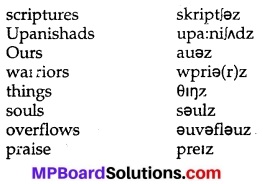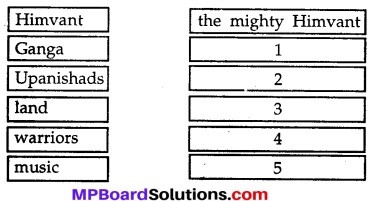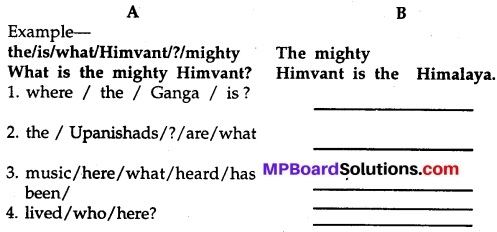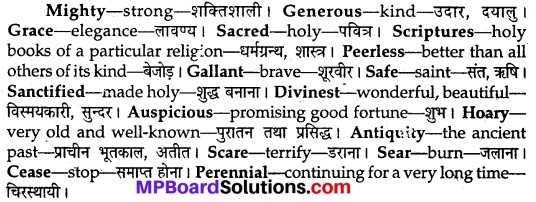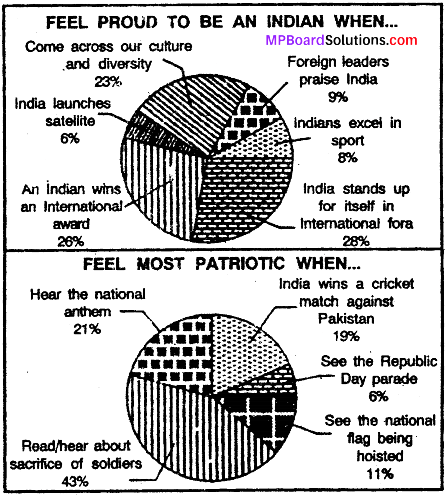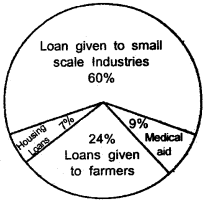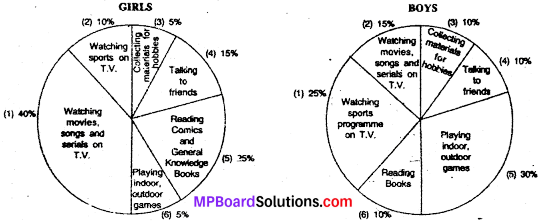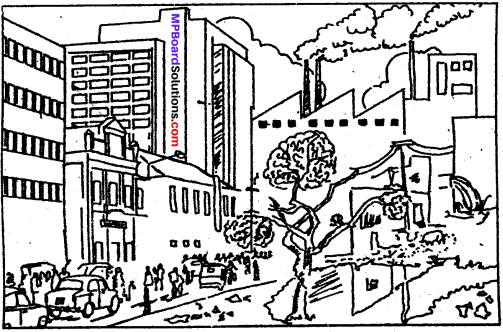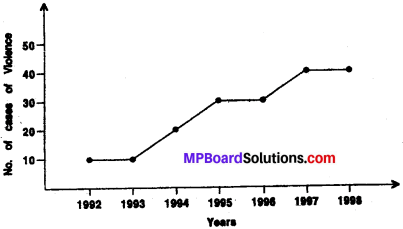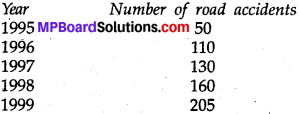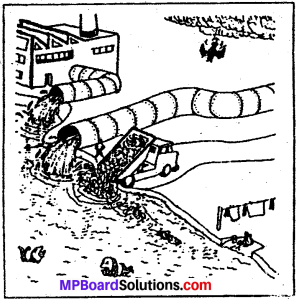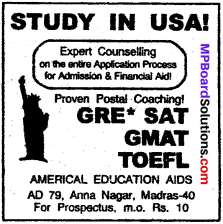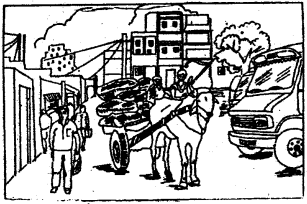MP Board Solutions for Class 9 English The Rainbow Solutions Chapter 2 The Victory Questions and Answers aids you to prepare all topics in it effectively. You need not worry about accuracy of Madhya Pradesh State Board Solutions for Class 9 English Chapter 2 The Victory as they are given adhering to the latest exam pattern and syllabus guidelines. You Can Download MP Board Class 9 English Solutions Questions and Answers, Notes, Summary, Guide pdf on is page. Enhance your subject knowledge by preparing from Chapterwise MP Board Solutions for Class 9 English and clarify your doubts on corresponding topics.
MP Board Class 9th English The Rainbow Solutions Chapter 2 The Victory
Kick start your preparation by using our online resource Madhya Pradesh State Board Solutions for Class 9 English The Rainbow Solutions Chapter 2 The Victory. You can even download MP Board Solutions for Class 9 English free of cost rough direct links available on our page. Clear your queries and understand concept behind in a simple manner. Simply tap on concept you wish to prepare chapterwise and go rough it.
The Victory Textual Exercises
The Victory Vocabulary
A. Find words in the lesson which have the meanings given below :
1. large fire made out of doors for pleasure or to burn dead leaves in a garden.
2. got down from a horse
3. part of the body between the neck and the top of the arm
4. success in a battle or in a game
5. cloth shelter as used by soldiers
Answer:
- Bonfire
- dismounted
- upper part of the body (shoulder)
- Victory/conquest
- tent.
B. Refer to a dictionary and find out the meanings of the fol-lowing. Use them in sentences. You can use the sentences given in the dictionary as models.
Countryside, winter, chanting, “taken, aback, dawn.
Answer:
| Word | Meaning | Usage |
| Countryside | rural area | There is little development in our countryside. |
| Winter | ||
| the cold season | Chilly winds blow in winter. | |
| Chanting | singing sweetly | The saints are chanting vedic mantras. |
| Taken aback | shocked | On seeing a dacoit, she was taken aback. |
| Dawn | early morning | We get up at dawn and go out for a morning walk. |
C. Notice the past tense of verbs ending with ‘-ed’ are pronounced in three different ways /I/, Id/ and /id/

Now pay attention to the pronunciation of the past tense forms of the following words and pronounce them in the class, ordered, consulted, entered, turned, slopped.
Answer:
For self-attempt.
D. Listen and put the following verbs in the correct columns.
lived, died, loved, stayed, finished, started, looked, liked/ conquered, announced, coughed, laughed, wanted.

Answer:

Comprehension
A. Answer each of the following questions in about 25 words.
1. Why did Alexander want to conquer India?
2. What did Alexander see while moving around the countryside?
3. Why did Alexander release King Puru and went back without winning the rest of India?
4. Who do you think was the real conqueror?
5. What made India famous as ‘the Golden Bird’?
Answer:
1. Alexander, the Great had won many battles. His desire was to conquer the world. India was known as the Golden Bird in the world at that time. Therefore, he wanted to conquer India.
2. After some days of battle, Alexander moved around the country side. He moved on the streets. He saw dark houses. He also saw bewailing women and crying children.
3. A saint called Alexander a robber and not a conqueror or a giver. This statement made Alexander sad and pale with shame. The saint’s advice to win the hearts of the countrymen with love made Alexander feel guilty. Therefore, he released King Puru and went back without winning the rest of India.
4. I agree with the saint. The real conqueror is one who wins the hearts of the countrymen with love. A robber can never be a conqueror and a giver.
5. India was known as the golden bird in the olden days. It was because the trade and commerce were supported by agriculture. It flourished to a desirable level. The handicraft was fine. The craftsmen were skilled. There was peace and economic prosperity. Arts, culture and architecture were on their climax.
B. Answer each of the following questions in about 50 words.
1. Describe the incident of Alexander’s encounter with the saint.
2. Describe the last conversation between the saint and Alexander. What was the effect of this conversation on Alexander?
Answer:
1. Alexander went to the place where the saints were per-forming the yagya. Nobody paid any attention to him. Then he went to the oldest saint. The saint did not notice him and Alexander felt totally ignored. Then approached another saint. He introduced himself as the famous Alexander the Great. The saint asked Alexander what he wanted. He also called him a young man. Alexander told him that he had conquered Hindustan. He also told him that he had brought woollen blankets, and clothes for all of the naked fakirs. He called Alexander a robber, rather than a conqueror.
2. Alexander : I am Alexander the conqueror of Hindustan. I have brought woollen blankets and clothes. I want to give them to all the naked ‘Fakirs’.
Saint: young man, you are a robber. You cannot be a conqueror or a giver. Win -the hearts of the countrymen with love if you want to conquer the world. We have renounced the world. We need nothing from you.
Alexander : Thank you. I have stopped my forward march. I shall release your king at dawn tomorrow. I shall also put off my future plans to conquer other parts of India.
The Victory Grammar
A. Study the following sentences.
1. His desire was to conquer the world.
2. He ordered his brave generals.
3. It crossed the mighty Himalayas.
4. There was a battle.
5. Alexander moved on the street1′ and drove his horse on and on.
The underlined verbs are in simple past tense. Now, put the verbs given in brackets into the simple past tense. Alexander (mount) his horse and quietly (slip) out of the tent to see more of the Indian countries. He (feel) no pity. Instead He (feel) proud of his own victory. Soon he (barn) his horse on the other side, towards the jungle.
Ans.
Alexander mounted his horse and quietly slipped out of the tent to see more of the Indian countries. He felt no pity. Instead he felt proud of his own victory. Soon he turned his horse .on the other side, towards the jungle.
B. Study these sentences.
- The women were wailing.
- The children were crying.
- The wind was blowing.
The underlined verb phrases are in past continuous tense. Now, put the verbs in brackets into the past continuous or simple past. He (notice) a bonfire at a distance. He (go) closer and (find) some Indian saints. They (perform) the yagya on the bank of Sindhu. He (stand) quietly behind the thick trunk of a tree. Alexander (not know) what to say. He (dismount) and (proceed) towards the oldest saint.
Answer:
He noticed a bonfire at a distance. He went closer and found some Indian saints. They were performing the yagya on the bank of the Sindhu. He stood quietly behind the thick trunk of a tree. Alexander did not know what to say. He dismounted and proceeded towards the oldest saint.
Speaking Activity
A. Complete the following conversation orally. Clue words are given there for your help.
Answer:
Alexander to the
Chief General : Bring thick woollen blankets and woollen clothes Immediately I need them urgently
Alexander to-
One of the saints : ‘Fakir’, listen I am the famous Alexander the great.
The saint to-
Alexander : What do you want, yougman?
What can I do for you?
Alexander to Well……………. well, I don’t want anything from you.
The saint : 1 am Alexander the Great. I have conquered your Hindustan.
The saint to : Young man, so you are the famous Alexander.
Alexander : Who conquers the countries by robbing them? Tell me, my child how can a robber be a conqueror and a giver?
B. Enact the above scene delivering the dialogues properly.
Answer:
Alexander ; Chief General : Some Fakirs are performing yagya. I want to give them woollen blankets and clothes.
Chief General : My Lord they are loaded on horses. Let us start the caravan.
Alexander reaches the jungle and meets a saint.
Alexander : Saint! I am Alexander, the Great. I have brought woollen blankets and clothes for all the naked fakirs.
Saint : Youngman ! what do you want from us?
Alexander : Saint! I want nothing from you. I have conquered your Hindustan.
Saint : Don’t be so proud. You are not a conqueror or a giver. You are simply a robber.
C. What is your opinion about :
- Alexander’s invading India.
- Alexander’s desire to conquer the world.
- The teachings of the Indian saints.
You can start expressing your opinion like this :
I agree/I disagree …………………….
I feel that ……….
I am of the opinion that……………
Friends, this is true that …………….
Well, let’s examine/think about ………………
Answer:
Do it yourself.
Writing ’Activity
A. Imagine that you are Alexander. Write the changes that took place in you after meeting the Indian saints. (50 words)
Answer:
I am Alexander. I considered myself as a great conqueror. I was proud of conquering Hindustan. I had no pity for wailing women and crying children. I met the Indian saints. I described myself as the conqueror of Hindustan. One of the saints called me a robber, rather than a conqueror. He advised me to win the hearts of the countrymen with love. They were ready even to give all that was left with them. It changed my heart and killed all my ambitions. I released King Puru. I also put off my future plans to conquer the rest of India.
B. Write a short note on the consequences of war.(150 words)
Answer:
All the wars are equally horrible. It poses a threat to the security of whole mankind. It also causes a big economic problem. Modem weapons are very different from weapons that were used in wars a hundred years ago. Heavy guns and artillery do a lot of damage to life and property. Millions of people are killed in war because of the destructive power of modem weapons. Besides the armed forces, these dangerous weapons create havoc to the lives of innocent civilians.
A large number of innocent civilian population lose their lives and modes of earning due to air raids, epidemics and famines. The economy of the warring countries shatters. A lot of social problems emerge. All types of institutions, factories and manufacturing units suffer serious jolts. Many women become widows. The children become orphans. The mediators worsen the situation. The country becomes a virtual pauaper. On the whole, wars have a black face. They are ghastly and costly affairs. They break the bones and backs of the warring countries.
Think it over
A. India was known as the golden bird in the olden days. It was because the trade and commerce supported by agriculture flourished. The handicraft was fine and the craftsmen skilled. Think about the present India. .
Answer:
India was great in ancient time. Students from Portugal Japan, Greece etc. used to come to study here. Nalanda and Taxila, were famous as educational centres. The country was at the climax ‘ of glory in every field. She was known as the golden bird.
Gone are those days. Now/ India can be called a plastic bird. The country is haunted by a host of problems. There is pollution, corruption, nepotism, price-hike, unemployment, child labour, dowry system, food problem, drug addiction and spread of black money. It is no more a sacred land. Terrorists, adulterists, anti-social and anti-nationalists are sucking her blood. They are disturbing the peace and integrity of India. It has become the land of scams and scandals.
B. When Alexander was coming to invade India his teacher told him to take blessings of Indian sages. Why?
Answer:
Alexander was coming to invade India. His teacher suggested Alexander to take blessings of Indian sages so that positive attitude might prevail on him. Moreover, he might cancel his plans to invade India.
C. How can one win people’s heart?
Answer:
The people are human beings. They need love and respect. Even a child does not like to be snubbed. Women are no longer the …aids of the house. Rather they have become the mistresses of the households. To win people’s heart, we need security, civility, obedience, utility and truthfulness. We can not win anybody’s heart by force or fraud.
Things to do
Convert the story into a one act play and try to enact it on the stage in the annual function. Take the help of your teacher, and friends.
Answer:
Class-room activity.
The Victory Additional Questions
Short Answer Questions . (About 25 words)
Question 1.
Why was Alexander happy?
Answer:
Alexander got victory in the battle with King Puru of India. He made the King his captive. As this was his first victory in India, he was very happy.
Question 2.
What did Alexander see in the jungle?
Answer:
Alexander turned towards the jungle where he saw a bonfire at a distance. He went closer and found some Indian saints, performing the yagya on the bank of the Sindhu
Question 3.
Why did he feel sorry for the saints?
Answer:
It was extremely cold and Alexander found the saints wearing no clothing on the upper parts of their bodies. He thought that they were poor and they did not have anything to cover their bodies. Hence, he felt sorry for them.
Question 4.
Why did he feel irritated?
Answer:
Alexander went,-closer to the saints, but they paid no attention to him. He patted his horse and coughed. Still no one noticed him. He felt totally ignored. Hence he got irritated.
Question 5.
Why did the saint throw1 a sharp glance at Alexander?
Answer:
The saint got annoyed when Alexander told him that he had conquered Hindustan and had come there to help them with woollen blankets and woollen clothes.
Question 6.
What did the saint call Alexander? Why did Alexander turn pale?
Answer:
The saint called Alexander a robber. He told him that a robber could never be a giver. These words of the saint left deep impact on Alexander. He became speechless. He turned pale.
Question 7.
What did Alexander finally decide?
Answer:
Finally Alexander decided to stop his forward march. He released King Puru and cancelled his future plant L win the other parts of India.
Long Answer-Type Questions (In about 50 words)
Question 1.
Give a brief account of Alexander, the Great and his encounter with Porus.
Answer:
Alexander (356-323 5.C.) was only 22 years old when he ascended the throne. He was a general. He divided his army into two units to effectively capture India. The first unit inyaded India under his personal leadership. He defeated the North Indian States. The other unit was under commander Hephastian. It defeated the kingdoms on the bank of river Indus. The Indian kingdoms were disunited. As such, they did not pose any virtual challenge to any of his units. As a result, the Greek army conquered all kingdoms before uniting at Ohind. Kings like Ambi accepted defeat without even fighting his army. However, his major battle was with Porus, a. formidable enemy and a great warrior. However, Alexander emerged victorious and made Porus a prisoner.
The Victory Summary in English
Alexander desired to conquer the world. He ordered his brave generals to proceed to India. The army crossed the Himalayas. They entered India and reached the river Sindhu. He defeated King Puru and made him captive.
Then Alexander mounted his horse. He saw women and children wailing. He did not show any pity for them. Rather he felt proud of his victory. Then he went towards the jungle. He found some Indian saints performing the yagya on the bank of the Sindhu. They were without clothing on the upper parts of their bodies. Alexander’s chief general brought heaps of thick blankets and woollen clothes.
Their caravan stopped near the saints. The saints ignored Alexander’s presence. Alexander introduced himself to a saint. The saint desired to know what he wanted from him. Alexander told the saint that he had conquered their country. He desired to give blankets and clothes to the naked saints. The saint called him a robber, not a conqueror or a giver.
The saint advised Alexander to win the hearts of the countrymen with love. Then alone he could conquer the world. They were ready to give him whatever he wanted. The feeling of guilt made Alexander sad and shy. He saluted the saint and returned with his caravan to the camp.Alexander decided to stop his forward march. He released King Puru. He also put off his future plans to conquer other parts of India.
The Victory Summary in Hindi
सिकंदर ने संसार को जीतने की इच्छा की। उसने भारत की तरफ बढ़ने के लिए अपने वीर जनरलों को आदेश दिया। सेना ने हिमालय पर्वतों को पार किया। वे भारत में घुस गए और सिन्धु नदी पर पहुंचे। उसने राजा पुरू को हरा दिया और उसे बंदी बना लिया।
फिर सिकंदर अपने घोड़े पर सवार हुआ। उसने महिलाओं और बच्चों को विताप करते देखा। उसने उनके ऊपर कोई तरस नहीं दिखाया। बल्कि वह अपनी विजय पर गर्वित हुआ। फिर वह जंगल की तरफ गया। उसने सिन्धु नदी के किनारे कुछ भारतीय संतों को यज्ञ करते पाया। उनके ऊपर वाले आधे शरीर पर वस्त्र नहीं थे।
सिकंदर का मुख्य जनरल मोटे कम्बलों और ऊनी कपड़ों के ढेर ले आया। उनका काफिला, संतों के नजदीक रुक गया। संतों ने सिकंदर की उपस्थिति को अनदेखा कर दिया। सिकंदर ने एक संत को अपना परिचय दिया। संत उससे जानना चाहता था कि उसे (सिकंदर को), उस (संत) से क्या चाहिए। सिकंदर ने संत को बताया कि उसने उनके देश को जीत लिया है। वह नंगे संतों को कम्बल और कपड़े देना चाहता है। संत ने उसे लुटेरा कहकर पुकारा और कहा कि वह विजेता या दानी नहीं है।
संत ने सिकंदर को उपदेश दिया कि प्यार द्वारा देशवासियों के दिलों को जीते। तभी वह विश्व को जीत पाएगा। जो कुछ उसे (सिकंदर को) चाहिए, वे (संत) उसे देने के लिए तैयार हैं। अपराध की भावना ने सिकंदर को दुखी और लज्जित कर दिया। उसने संत को प्रणाम किया और अपने काफिले के साथ अपने शिविर में लौट गया। सिकंदर ने आगे युद्ध करने को बन्द करने का निर्णय लिया, उसने राजा पुरू को मुक्त कर दिया। उसने भारत के दूसरे भागों को भविष्य में जीतने की योजना भी स्थगित कर दिया।
Word-Meanings
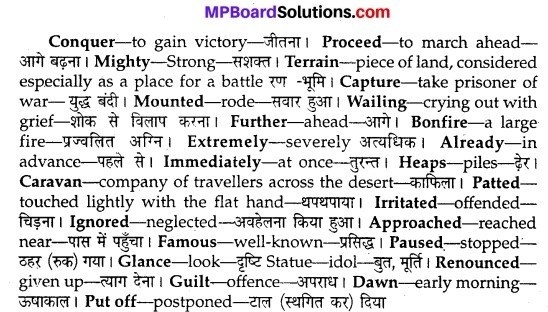
We believe the information shared regarding MP Board Solutions for Class 9 English The Rainbow Solutions Chapter 2 The Victory Questions and Answers as far as our knowledge is concerned is true and reliable. In case of any queries or suggestions do leave us your feedback and our team will guide you at soonest possibility. Bookmark our site to avail latest updates on several state board Solutions at your fingertips.
